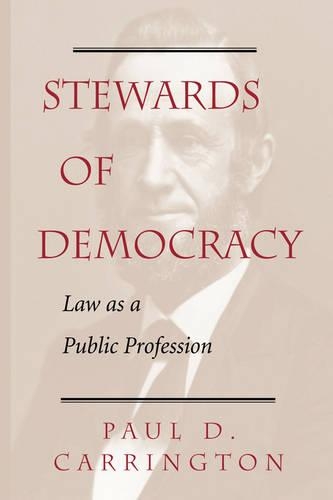
Stewards Of Democracy: Law As Public Profession
(Hardback)
Publishing Details
Stewards Of Democracy: Law As Public Profession
By (Author) Paul Carrington
Basic Books
Basic Books
30th July 1999
United States
Classifications
Tertiary Education
Non Fiction
340.1
Physical Properties
Hardback
320
Width 155mm, Height 235mm
Description
Stewards of Democracy is a celebration of a moral tradition famously observed by Alexis de Tocqueville through the eyes of Francis Lieber, a Prussian emigr who in antebellum times wrote of political ethics, hermeneutics, and comparative constitutional law as aspects of the moral duties of American lawyers and judges. The duty of the profession unifying this tradition has been to nurture and protect the institutions of self-government on which depend the stability of our complex social order and the protection of all our legal rights. Thomas Cooley, perhaps the lawyer most respected by nineteenth century Americans, is presented as a primary exemplar of the dutiful tradition. Much of the book is an account of his career as judge, scholar, teacher, and founding chair of the Interstate Commerce Commission. Cooleys career was succeeded in the tradition by a trio of Progressives: Louis Brandeis, Ernst Freund, and Learned Hand, whose careers area also examined. Finally noted is the more recent career of Byron White. Carrington contends that the dutiful tradition marked by the careers of the five exemplars is threatened by the mutually reinforcing tendencies of the Supreme Court and other high courts, of highly respected legal scholars, of the most honored of our law schools, and of noted legal journalists, all of whom tend to work from the premise that political and moral judgments can best be made by an elite and imposed on a passive citizenry, a belief tending to fulfill itself. The result is a threatened suffocation of the political institutions commanding the loyalty and enduring support of citizens. The book concludes by suggesting possible causes for a future reversal of this long-term trend and the steps such a reversal might entail.
Author Bio
Paul Carrington teaches civil procedure at Duke University Law School. From 1985 to 1992 he served as reporter for the Committee of the Judicial Conference of the United States, advising the Conference and the Supreme Court on changes in the Federal Rules of Civil Procedure.
